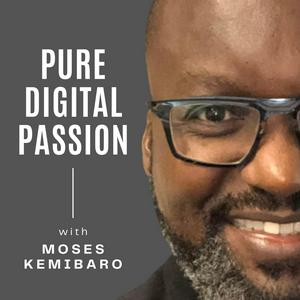I had a fantastic time joining Joan Anyango for the very first episode of her "Tech It From Me" podcast. We took a deep dive into what drives me from those early dial-up Internet days in 1997 to building Dotsavvy right out of my bedroom back in 2002, and now navigating the AI era that's changing everything as know it.Personal BrandingWhen Joan asked what sets me apart in this crowded industry, I pointed straight to personal branding through consistent content creation. I've been blogging for over 15 years, sharing insights on technology in Kenya and Africa. It's not about being the smartest—it's about showing up obsessively and authentically. People connect with the unvarnished truth. Think about those behind-the-scenes clips from podcasts—they often get more views than the final edit because folks crave that real connection. I tell everyone: everything is content. Even what feels trivial can open doors if it's genuine.AI's Role in Digital Marketing – Empowerment & DisruptionWe got into how AI is transforming digital marketing, and it's not just hype—it's an "and" situation. For mama mbogas or jua kali guys, tools like ChatGPT let you create a full month's content calendar in minutes. No more expensive agencies needed. Bigger brands? They're optimizing costs, skipping costly photoshoots and model releases using AI creative. But here's the flip side: it's disrupting traditional jobs in photography, video production, and design. Folks in those fields need to upskill fast, taking their 10,000 hours of expertise and applying it to AI prompts. Otherwise, the tools will pass them by. Brands make a mistake rushing into ads without a solid story or reputation—digital amplifies every complaint. Fix your product, build your identity with a great website and value-driven social content, then sell.Smart Platform Choices in a TikTokified WorldJoan asked about social media recommendations, and I always say start with your audience and what you're selling. For my B2B world—banks, insurance, real estate—LinkedIn is king (think Facebook with a suit and tie), followed by Facebook for older decision-makers. For younger crowds, Gen Z and millennials? Instagram and TikTok all the way, where authenticity shines. The big shift? TikTokification. Followers don't matter anymore—algorithms push content based on quality and engagement, not your count. A creator with 40 followers can go viral with millions of views if it resonates. Focus on what converts, not vanity metrics.Advice for Digital Marketing BeginnersFor newcomers, embrace the AI era head-on. Play with tools like ChatGPT, Canva, Otter.ai, and Nano Banana for images. Don't copy others—find your unique fingerprint. I'm a writer at heart, so I lean there, but maybe you're killer at short videos or threads. Prompt engineering is emerging as a high-value skill, and reasoning models in AI can handle consultant-level work.Proud Career Moments and Favorite ToolsI'm proudest of pioneering the Kenya National Examinations Council's first online results portal around 2005—students checking KCPE and KCSE results online for the first time, and the servers didn't crash! Another highlight: videos showcasing how internet access empowers students with disabilities, blending storytelling with real impact.Africa's Bright Digital FutureWe wrapped on a high note: Africa's underrated in the digital game. Our young, tech-savvy, digital-native population is our superpower. If we invest in them, we'll lead the world in AI and innovation, not chase it.Timestamps:0:00 - Introduction & My Background (Father, Founder, Podcaster)4:30 - Personal Branding Secrets11:00 - AI in Marketing: Hustle Booster & Job Shaker19:00 - Common Brand Mistakes & Storytelling26:00 - Best Platforms Explained33:00 - Tips for Digital Newbies40:00 - Career Highlights (KNEC Portal, Impact Videos)47:00 - Tools I Can't Live Without54:00 - Africa's Digital Future


